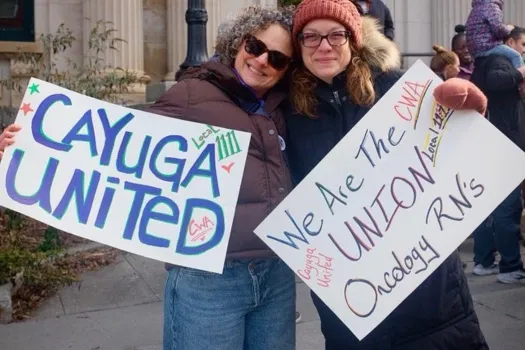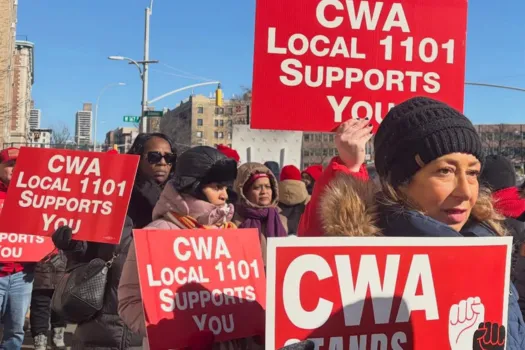Political Action Updates - March 2024
CWA D1 Welcomes Our Newest Member Political Activist Trainers!
Earlier this month, 16 CWAers who have previously taken part in political action trainings as participants stepped up to be a part of a three-day Train-the-Trainer program to become workshop trainers themselves. CWA’s Reversing Runaway Inequality workshop is one of our most celebrated parts of the Political Activist Training program, and is always conducted by member trainers - the 16 new trainers are now are ready to bring political education, organizing skills and engagement to our membership as we continue to build solidarity and power for workers in our union and beyond.
Learn more about all our trainings here!
New Jersey
CWAers Hold Massive Political Action Training and Lobby Day In New Jersey
On March 4th, more than 75 CWA members gathered in Trenton, NJ for our first Lobby Day of 2024! Members spent the morning at CWA Local 1033’s office to discuss our 2024 legislative priorities, learn more about the legislative process, and sharpen their lobbying skills before putting those skills to task with visits to the Statehouse to speak directly with legislators.
Members attended several legislative committee hearings and spoke with their elected leaders about several pro-worker pieces of legislation that CWA is fighting for including safe staffing legislation for healthcare workers, a bill that would expand affordable housing, legislation to regulate hospital prices and expanding family medical leave. You can read through the full Worker Power 2024 Legislative Agenda here.
CWA Members Fight to Protect the New Jersey Open Public Records Act (OPRA)
In a sudden and surprising move, NJ legislators introduced and fast-tracked a major piece of legislation (S-3920/A-4045), overhauling the Open Public Records Act (OPRA), which would have made it harder for unions, the public, and media to access important information and governmental records, severely damaging transparency and accountability. This bill was crafted behind closed doors without any input from community stakeholders and there was no reason for the rush to ram it through within a week. CWA is part of a huge coalition of labor and community groups that came out in strong opposition to this reform—and our members immediately sprang into action!
We testified in the statehouse along with members of the NewsGuild-CWA, sent over 800 emails, and made hundreds of calls to State legislators urging them to stop the fast-tracking of this harmful legislation.
“Democracy dies in the dark,” CWA District 1 Vice President Dennis Trainor in a public statement. “And at a pivotal time in history—in which our very democracy is under very real threats—our government should not be undermining the people's right to vital information. The way the legislature is contemplating revamping OPRA will have a chilling effect and devastating impact on our ability to get a hold of crucial information. These rollbacks will make government less accountable to the public.”
Our campaign worked! CWA helped get the bill pulled from the agenda, stopping the bill’s forward progress, and buying more time for our coalition to fight back against this attack on accountability and government transparency.
New York
Proposed Budgets for 2025 Would Include Big Gains for Workers—But the Fight Isn’t Over Yet
The New York State Assembly and Senate passed their budget proposals earlier this month with several inclusions that would mean big wins for CWA members.
One of our main legislative priorities this year is to close the Medicaid gap and ensure that all New Yorkers have access to the care they deserve, as well as get hospitals the funding that they need in order to adequately staff up and improve working conditions for workers. In both of the Assembly and Senate versions of the budget, the hospital Medicaid reimbursement rates are increased to 10%. The budget proposals also include funding for financially distressed hospitals, which many of our members work at. This is great news—but we need to make sure that these important investments stay in the final budget.
You can help! Send an email right now to tell your NYS Legislators: Close the Medicaid gap and get healthcare centers the funding they need!
We were also pleased to see both the Senate and Assembly include proposals to raise revenue and make our tax structure more fair for working New Yorkers. Both houses included an increase to the personal income tax rates for New Yorkers making above $5 million, as well as an increase to the corporate tax rate for companies with a net business income of over $5 million!
Other proposals include an increase in school funding, addressing the housing crisis, and making New York more affordable. Click here to read more.
The final budget is due on April 1st, and we’ll continue to fight in Albany for our priorities as three-way negotiations begin between the Senate, Assembly and Governor’s office!
Graduate Workers Hold Higher Education Action Day to Advocate for Financial Support for NYS Universities
On February 27th, members of the CWA 1104 Graduate Student Employees Union (GSEU) traveled from across the state to gather in Albany for Higher Education Action Day. Alongside faculty and staff unions, student advocacy organizations, and other supporters, GSEU members fought for the funding necessary to support our institutions of higher education. Among the items on the agenda were funding for the CUNY school of labor and urban studies, reforming the Tuition Assistance Program, and increased aid to campuses across New York. Legislative meetings were held with Chair of Labor Assemblymember Harry Bronson and other champions for workers.
Connecticut
CT Strike bill https://twitter.com/ConnAFLCIO/status/1760712541670453381
CWA Local 1298 President Dave Weidlich and Shop Steward Kim Edwards testified last month before the Joint Labor and Public Employees Committee in Connecticut in support of H.B. No. 5164: An Act Concerning Unemployment Benefits in the state of Connecticut—a bill that would make Unemployment Insurance available to striking workers after two weeks on strike. As it currently stands, striking workers in Connecticut are not eligible for UI.
“Unionized workplaces raise standards for all workers,” Dave said in his testimony. “When workers strike, they fight for protections that benefit all workers. [...] After the UAW won significant wage increases, non-union automakers were forced to increase their pay and benefits to compete. That helps all workers and strengthens our economy.”
If passed, Connecticut would become just the third state after New York and New Jersey to provide Unemployment Insurance to striking workers. This would incentivize employers to remain at the bargaining table and negotiate in good faith, and make it easier for workers to fight for the rights, wages, and contracts that we deserve.
“Making striking workers eligible for UI is, therefore, both good economics and consistent with the program’s mandate,” Kim testified. “It would mitigate some of the immediate economic risks to workers and their families, keep dollars flowing to communities where a strike is taking place, and ensure striking workers can negotiate a fair contract with their employer.”
Watch video of the hearing here, and read Dave’s full testimony and Kim’s full testimony.
Following the committee meeting, H.B. No. 5164 made it out of committee with a joint favorable submission.
From the Desk of the Vice President of CWA District 1
“The hard work is just starting, but nurses are good at hard work”: Cayuga Medical Center Nurses Vote to Join CWA!
Largest Nurses Strike in NYC History: CWA Stands with NYSNA!

